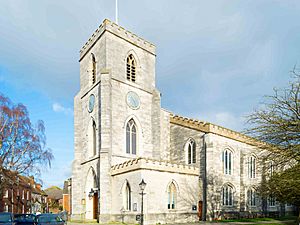St James' Church, Poole facts for kids
Quick facts for kids St James Church |
|
|---|---|

St James Church
|
|
| Denomination | Church of England |
| Website | stjameschurchpoole.com |
| History | |
| Dedication | James, son of Zebedee |
| Administration | |
| Parish | St James (Poole) |
| Diocese | Salisbury |
| Province | Canterbury |
St James Church is a special church in Poole, a town on the south coast of England. It's part of the Church of England. You can find it in the old part of Poole, very close to the beautiful Poole Harbour. This church is important for the local community. It's still used today and even has a big playgroup for children. Lucy Holt is the minister who leads the church now.
Contents
A Look at St James Church History
The church is named after Saint James. Long ago, Poole was a starting point for people traveling to Europe. They would begin their journey to a famous pilgrimage route called the Camino de Santiago.
The Fishermen's Church
St James Church has always been connected to the sea and fishing. That's why many people in Poole call it 'the fishermen's church'. You might notice something unique on top of the church: its weather vane is shaped like a fish!
How the Church Was Built
A church has stood on this spot for about 800 years. But at the start of the 1800s, Poole was a very rich town because of its trade with Newfoundland. Local business people decided to rebuild the church. They chose a style called Georgian architecture. This is the beautiful building we see today. Experts think it's a great example of Georgian church design in England. It's even listed as a Grade II* building by English Heritage, which means it's very important.
The Churchyard
The church has a small churchyard. Most of the graves there are from the 1700s and early 1800s. Later, people from the church were buried in other cemeteries in Poole.
The Legend of the Bells
St James Church has a long history of bell ringing. There's a local story about its bells from a long time ago, during the reign of King Edward VI. The Duke of Somerset supposedly ordered eight of the church's bells to be sold. The money from the sale was meant to help build defenses for Poole. Sadly, the story says that these bells were lost at sea while they were being shipped to Holland.
Gallery
 | Anna J. Cooper |
 | Mary McLeod Bethune |
 | Lillie Mae Bradford |



